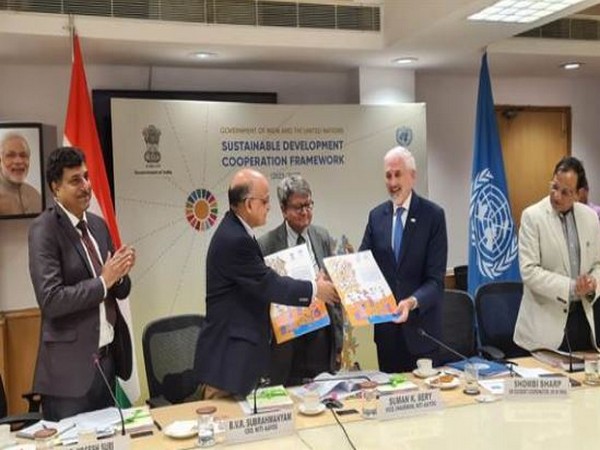New Delhi [India], June 16 (ANI): The Sustainable Development Cooperation Framework 2023-2027 between the Government of India and the United Nations was signed today by NITI Aayog and the UN office in India.
In the presence of the Vice Chairman of NITI Aayog, Suman Bery, senior members from NITI Aayog, central ministries, and heads of UN agencies in India, B V R Subrahmanyam, CEO, of NITI Aayog, and Shombi Sharp, UN Resident Coordinator, India, signed the GoI-UNSDCF, the official release of NITI Aayog said.
GoI-UNSDCF 2023-2027 represents the UN development system’s collective offer to the Government of India, in line with the national vision for development, for the achievement of the Sustainable Development Goals, promoting gender equality, youth empowerment and human rights.
The United Nations General Assembly Resolution A/RES/72/279 designates the United Nations Sustainable Development Cooperation Framework as the principal planning and implementation instrument for the UN Development System at the country level. Programme priorities of the UN entities working at the country are derived from the GoI-UNSDCF, the official release read.
According to the release, the GoI-UNSDCF 2023-2027 is built on four strategic pillars derived from the 2030 Agenda – People, Prosperity, Planet and Participation.
Six outcome categories centred on health and well-being, nutrition and food security, quality education, economic growth and decent work, environment, climate, WASH and resilience, and empowering individuals, communities, and institutions make up the four interconnected pillars.
For the first time, the GoI-UNSDCF will specifically focus on SDG localization and South-South cooperation in order to further expand cooperation in crucial sectors, in keeping with India’s leadership towards the implementation and acceleration of the SDGs and India’s championing of South-South cooperation. The effort’s focal point will be showcasing Indian examples of growth internationally.
The formulation of the GoI-UNSDCF 2023-2027 was led by NITI Aayog, on behalf of the Government of India, with robust participation of line Ministries, State Governments, and Union Territories.
The UN Resident Coordinator led and coordinated inputs from the UN development system in India. Partners from civil society, think tanks, the private sector, cooperatives and labour unions also contributed to the development of the document, ensuring a whole of society, whole of government and whole of UN approach. The GoI-UNSDCF was informed by a third-party evaluation of the previous Cooperation Framework (2018-2022) and a Common Country Analysis (CCA) undertaken by the UN in India.
The implementation, monitoring and reporting of GoI-UNSDCF 2023-2027 will be co-led by the Government of India and the United Nations, India through a Joint Steering Committee, according to the official release of NITI Aayog.
According to the official release of NITI Aayog, while signing the Cooperation Framework, CEO of NITI Aayog, B V R Subrahmanyam, said: “India has advanced steadily in its ability to deliver development and resilience at scale. This includes transforming India’s social welfare system and safety nets, underpinned by a robust ecosystem of digital public infrastructure and a range of national missions. India’s leadership in climate action and resilience continues to grow.
The new Framework comes at a critical juncture as the world reaches the halfway mark to achieve the 2030 Agenda for Sustainable Development. India envisions a ‘Viksit Bharat’ over the next 25 years, in line with the clarion call of the Hon’ble Prime Minister.
At the event, presenting the Cooperation Framework. United Nations Resident Coordinator in India, Shombi Sharp, stated: “India is a key shaper of the 2030 Agenda. With the goal of ‘Leave No One Behind’ reflected in the Government of India’s message of Sabka Saath, Sabka Vikas, India has aligned its flagship national initiatives with the SDGs and translated Agenda 2030 into local actions at all levels, while delivering development gains at scale. Meeting India’s youthful population’s expectations and aspirations will require further accelerating progress in addressing remaining development challenges and investing in human capital to leverage a unique demographic dividend. As the United Nations Secretary-General has said, India is the country that can make achieving the SDGs a global reality”. (ANI)
















